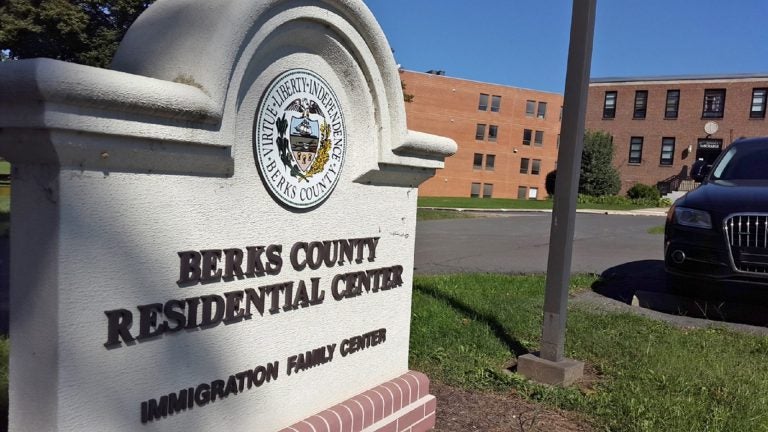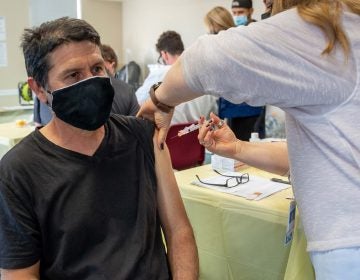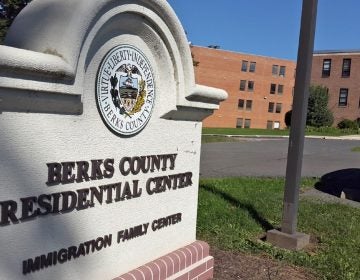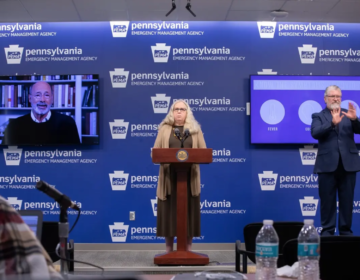A Berks immigration center detainee and six staff have contracted COVID-19 since October
Six employees at the Berks Family Residential center have tested positive for coronavirus in the last two months.

Berks County Residential Center, July 19, 2019. (Katie Meyer/WITF)
Six employees at the Berks Family Residential center have tested positive for coronavirus in the last two months, and earlier this month, the center reported its first case among detainees.
The detainee’s case is one of more than 100 confirmed cases of COVID-19 among asylum-seeking families detained by the federal government.
The center’s cases were revealed in filings by the U.S. Department of Homeland Security earlier this month in a Washington, D.C. district court. The filings are part of an ongoing court case in which multiple immigrant advocacy legal groups call for families to be released from detention due to the pandemic. The documents detail how COVID-19 has entered the nation’s three family detention centers in recent months.
At Berks, it appears the detainee had COVID-19 upon arrival there. The asymptomatic detainee arrived Dec. 1 and was tested. The results came back on Dec. 8. The detainee was isolated until Dec. 22, according to the DHS.
The center’s first case of COVID-19 was a medical staff member in the center in October.
The court filings give this timeline of employees who contracted coronavirus since then:
- A medical records technician had symptoms on Nov. 20 and was tested on Nov. 22. Their results came back positive on Nov. 27. They did not work in the center the week between having symptoms and getting their results.
- A contract coordinator was tested off-site on Nov. 23 due to having symptoms. That employee got their positive results back the next day.
- A shelter care counselor was tested Dec. 1 due to symptoms that started that day. Their positive results came back on Dec. 4.
- Another shelter care counselor had been exposed to a person with COVID-19 and began experiencing symptoms on Dec. 2. They were tested that same day. Positive results came back Dec. 4.
- A third shelter care counselor began having symptoms on Dec. 5 and was tested on Dec. 8. The positive test results came back on Dec. 12.
All employees quarantined for two weeks following their positive tests and participated in contact tracing, according to the court documents. None was in close contact with detainees or other employees 48 hours before the onset of symptoms, the filing says.
The detainee did not have close contact with other residents outside their family members, who were also tested. All other intakes who arrived at the facility with the COVID-19-positive detainee were asymptomatic and remained in a group for two weeks, according to court documents.
Immigration officials monitored and assessed the cohort of detainees for signs and symptoms of COVID-19 once a day, the documents said. No other cases have been reported among detainees in Berks as of Wednesday evening.
The information in the filings underscores immigrant advocates’ fears of confining families during the pandemic and their efforts to remove families from the center.
Jasmine Rivera with the Shut Down Berks Coalition, a group working to end family detention, says she fears the center’s other detainees are at risk. There are 20 detainees housed in the Berks center.
“They want to be safe, they want to be healthy, they want to protect their children, and they can’t while they’re incarcerated,” Rivera said. “So we pray to God that COVID doesn’t continue to spread, although we know intellectually, that it most likely will.”
U.S. Immigration and Customs Enforcement officials said detention centers are following detailed protocols and remaining vigilant in ensuring the well-being of staff and detainees.
“The Berks Family Residential Center continues to provide a safe and humane environment for families as they move through the immigration process,” ICE officials said in a written statement. “The center is subject to frequent inspections by the Pennsylvania Department of Human Services and is regularly found to be fully in compliance with state regulations and mandates, and is frequently commended for the exceptional manner in which the health, safety, and treatment of its residents are maintained.”
Protocols include testing all entering detainees within 12 to 24 hours of arrival. Asymptomatic detainees waiting for test results are kept from the general population, and symptomatic detainees waiting for results are placed in isolation, according to guidelines.
Shut Down Berks said detainees have expressed that isolation and quarantine can feel punitive.
“When I seek out medical attention, ICE puts us in solitary confinement for 30 days, regardless of getting a negative COVID test,” a detained Haitian mother said in a statement to Shut Down Berks. “We are now afraid of seeking medical care.”
The Berks Center is dwarfed in size when compared to the nation’s two other family detention centers in Texas — The South Texas Family residential Center in Dilley, and the Karnes County Family Residential Center.
Those centers have also seen 120 cases of COVID-19 among detainees, according to U.S. Immigration and Custom Enforcement statistics.
Among all ICE detainees held anywhere in the U.S., more than 1 in 10 — a total of 8,415 — have had COVID-19 and eight have died from the disease, according to those same statistics.
ICE officials Wednesday also noted that a judge refused to issue an emergency removal order this summer, finding conditions in the center did not warrant such an order.
Advocates are calling on Gov. Tom Wolf to issue an emergency removal order for families in the center, which is operated in an agreement between the federal government and Berks County, and also has some state oversight.
The Wolf administration last year did not heed calls for an emergency removal order, saying only the federal government could do that.
Shut Down Berks is calling on President-elect Joe Biden to end family detention. Biden’s former boss, President Barack Obama, came under fire in his terms as president for the policy of family detention and for his record deportations.
Trump’s immigration policies have also played into the issue of family deportation. How asylum-seekers are interviewed and other processes under his administration have been litigated.
Biden’s immigration plan does not outright state he intends on ending family detention.
Rather, the plan says he wants to prevent prolonged and indefinite detention of minors. It also says “Biden will codify protections to safeguard children to make sure their treatment is consistent with their best interest and invest in community-based case management programs.”
Anthony Orozco is a fellow with Report for America, a national service program that places talented emerging journalists in local newsrooms to report on under-covered topics and communities.
WHYY is your source for fact-based, in-depth journalism and information. As a nonprofit organization, we rely on financial support from readers like you. Please give today.


![CoronavirusPandemic_1024x512[1]](https://whyy.org/wp-content/uploads/2020/03/CoronavirusPandemic_1024x5121-300x150.jpg)


